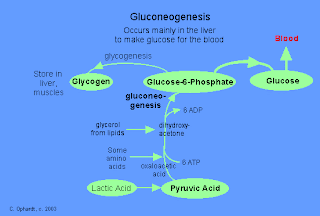The usual figure in relation to how much ingested protein is converted into glucose in the liver is about 57% of ingested calories as protein. However, a new study casts doubt as to the extent of this conversion. The study involved 8 human subjects, who first fasted overnight. Fasting overnight reduces the liver stores of glycogen, which is broken down to provide glucose when carbohydrates aren't consumed, such as when you are sleeping. As such, liver glycogen stores are relatively low when you awaken, assuming that you haven't eaten anything throughout the night. After awakening, the eight subjects were intravenously infused with radioactively labeled glucose. Two hours later, they ingested a 4-egg omelet, which also contained tracers to follow the fate of the ingested protein. This meal contained 23 grams of protein. The researchers examined the production of glucose from the meal for 8 hours.
What they found was that the endogenous production of glucose didn't change after the meal, despite the metabolism of the proteins contained in the meal. The production of glucose in the body declined after 6 hours. The maximal contribution of amino acids from the meal to glucose production in the body occurred between 3 and 5 hours after the meal, representing only 5% of the glucose produced in the body during that time. Of the 53 grams of glucose produced over 8 hours, 1.8 grams originated from the ingested protein meal.Based on this, the study authors concluded that protein and fat eaten alone do not significantly contribute to glucose production in the body. They did not disclose where the other 52 grams of glucose that were produced over 8 hours came from, but it likley came from other sources, such as lactate or glycerol, or perhaps from breakdown of glycogen in the liver.
This study would seem to indicate that the contribution of protein to glucose production has been overplayed. However, the study also shows that despite little contribution from the egg meal to glucose production, glucose was still produced from something, but it wasn't from protein. I suspect that since the subjects only fasted overnight, that they still had sufficient glycogen remaining in their livers to contribute to the glucose production. It would be more interesting to have them eliminate all carbs for at least a week or so, then test for the fate of ingested protein. If the body still has a source of glucose, such as liver glycogen stores, there would be little or no need to convert ingested proteins into glucose, as was shown in this study. On the other hand, if it turns out that ingested protein doesn't significantly contribute to glucose production, it would mean that the warnings about muscle protein breakdown during extended low carb diets may be true after all. That awaits further research, however.
Fromentin,C , et al. Dietary proteins poorly contribute to the endogenous production of glucose after egg ingestion in humans.Ann Nutr Metab2011;58(supp1);319.
©,2013 Jerry Brainum. Any reprinting in any type of media, including electronic and foreign is expressly prohibited.
